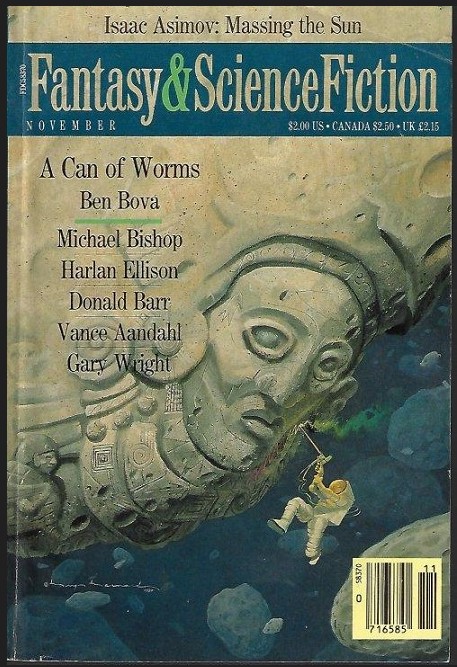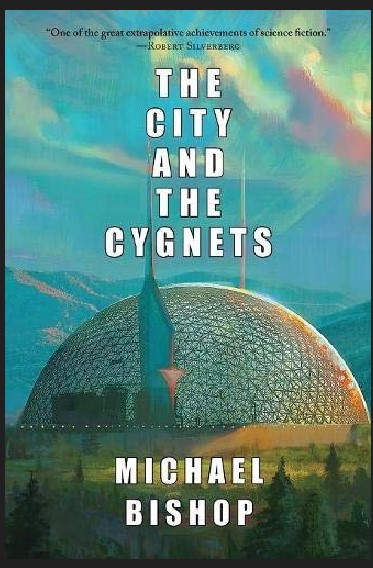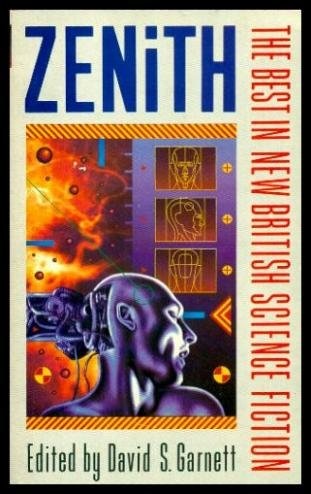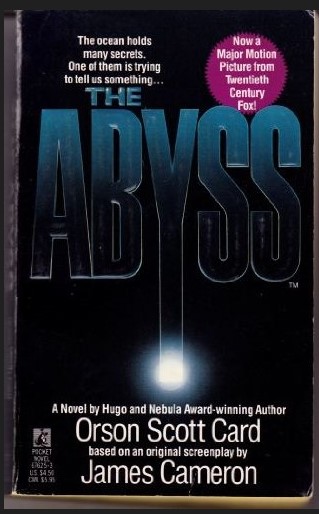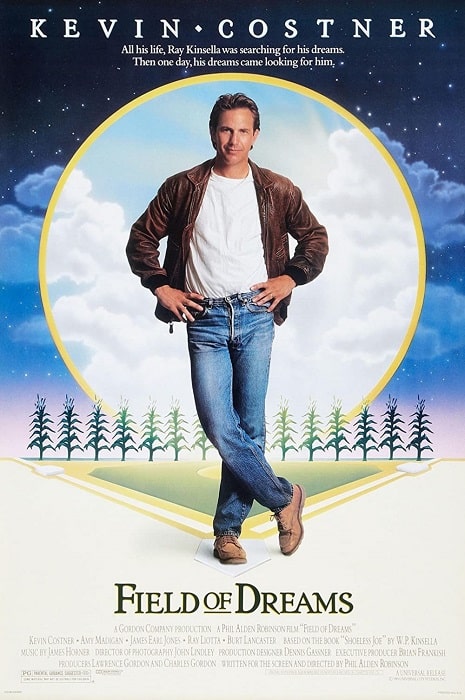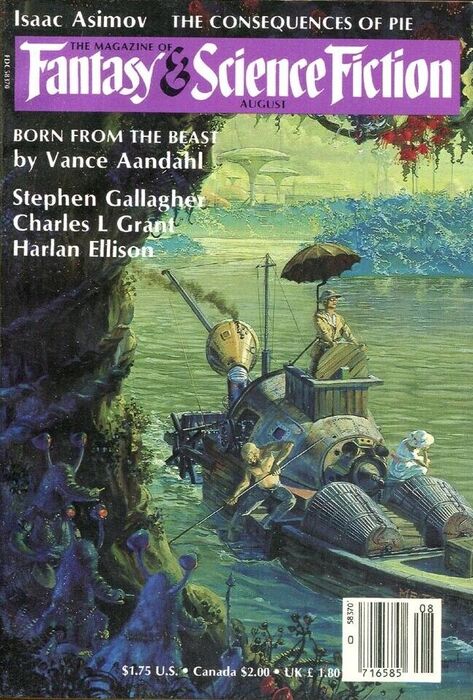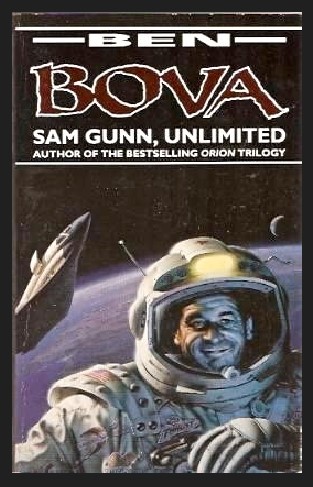Quatro-Decadal Review: The Magazine of Fantasy and Science Fiction, November 1989, edited by Edward Ferman
The Magazine of Fantasy and Science Fiction,
November 1989. Cover by Bryn Barnard
I thought that Asimov’s was going to rule the 1988 roost, but MoF&SF gives it a run for its money.
The issue jumps straight into the fiction!
Fiction — “Icicle Music” by Michael Bishop
A story told in time jumps, starting on Christmas Eve 1957. Danny Pitts, living with his mother in a small boxy house near the waste dump — is up early, and finds his wished-for shotgun that his single mom must have saved for over the year. His father is a bum, out of the picture for a couple of years. Then Danny hears a strange sound, like icicles breaking and the pawing of something on the roof. Then a man comes down the chimney,
Then a pair of booted feet appeared in the firebox, dangling down uncertainly, both boots as worn as harness leather… A pair of skinny legs in mud-fouled khaki materialized in the shadows above them. With a grunt and a muttered curse, a man in a heavy red-plaid coat kicked away the papers, ducked out of the firebox, and hobbled over to the tree, carrying what looked like a grungy World War II duffel bag.
Since it is an empty WWII duffel bag, Danny askes him to stop, the guy throws a glass ornament from the tree at him and Danny blasts him with his new shotgun. He and his mother find the guy struggling up the chimney.
Outside they see him stumble out of the chimney and mount a deer, then fly off, but not before revealing it is Danny’s no-good father, Clifton. He throws another ornament at them, and Danny’s mom blasts him with the shotgun and both he and the deer fall dead from the sky.
Danny renders the deer, and his mother hides the body in the dump.
It is revealed that Danny is telling this story to a friend named Phillip on Christmas Eve 1987, in the hospital where Danny is dying of AIDS. Danny is the director of the local theater. He tells Phillip another story: Christmas Eve 1967. Danny, camping in deep winter and this time he sees his dad’s ghost.
Clifton’s ghost steals his sleeping bag and Danny barely survives by finding a haybale left out for deer and burrowing inside.
1977 he appears again, in the intensive care unit in Whichat, where Danny’s mother is dying and Clifton’s ghost steals his mother’s soul.
Danny dismisses Phillip and waits for his father to free him from both the physical and emotional pain that he is in.
This was an odd little story, and probably could only make sense told in the in the way it was. A bit on the overly-artsy side (which sounds like the kind of complaint that Clifton would have!).
Michael Bishop is one of those authors who wasn’t lucky enough to land in the top-tier among the Asimovs, Butlers, Herberts and Le Guinns of SF/F, but he is one of those B+ tier writers that people ‘discover’ — they discover that he has had a huge career and a respectable backlog of great work. At 77 years old he may still be writing to this day.
The City and the Cygnets: An Alternative History of the Atlanta Urban Nucleus in the
21st Century, by Michael Bishop (Kudzu Planet Productions, August 2019). Cover by Amit Dutta
Column — Books, by Algis Budrys
Budrys rambles on about MexiCon, held that year in the UK. A representative sample is provided:
For the fact is that ever since Kinglsey Amis spoke up at Princeton as an envoy from another way of looking at what had been John Campbell’s domain, and the New Worlds people took it the next step on, and Brian Aldiss made a sensation over there — beginning in F&SF as a matter of fact, and J.G. Ballard found a public, what might well from a U.S. perspective be called British SF had had a powerful and growing influence on the style and thinking of younger U.S. writers. Some of the latter are not so young anymore, and have their own apprentices. But these whole schools of U.S-domiciled writers are apparently not included in the pictures of Yank SF as referred-to by many of Kincaid’s respondents. Perhaps because what they do is so understandable as to be overlooked.
Woof!
Eventually he gets around to some books.
Zenith, by David S. Garnett, an anthology
What Zenith is, in fact, is a very good anthology of original SF short work by people you may very well never have heard of, Aldiss and Lisa Tuttle excepted.
Zenith: The Best in New British Science Fiction
(Sphere, June 1989). Cover by Peter Gudynas
The Abyss, Orson Scott Card’s novelization of James Cameron’s movie.
Written not just from the script, but from watching the filming dailies. An interesting point: the creatures deep in the abyss are specifically mentioned as aliens, not some sort of advanced indigenous ocean life, as one might gather from the film.
The Abyss (Pocket Books, June 1989)
Budrys quite likes it, although mostly he seems taken by the “Behind the Story” vibe of the book’s creation.
Fiction — “The Extra Ancestor” by Donald Barr
A long way around the barn to develop a story of genetic engineering gone wrong. Eddy Edgerton, thanks to genetic tinkering, has an unnaturally strong sense of smell.
Professor Wagram, genetic scientist who used to play god, looks up one of his earlier creations — a boy named Eddy Edgerton, whose genetic alteration is that he has an unnaturally strong sense of smell. Wagram is poking around to see if Edgerton’s ability has any real practical value, which it does not appear to have. He simply has an overly developed sense of smell, which causes him a lot of problems. Both 20YOM and 52YOM found this one to be pretty mediocre.
Donald Barr’s seems to have a small science-fiction career, his main claim to fame seems to have been that he hired Jeffery Epstein to teach math.
Fiction — “Divergence” by Jennifer Swift
A Creationist vs. Science tale that puts one Jewell Meeks, daughter of Flood Researcher Dr. Leroy Meeks, as an agent enrolled at the local college on a mission to debunk evolution and geology.
A lifetime of creationist platitudes fall apart pretty quickly once the real lab work begins, and the pressure gets turned up when she makes a discovery (about non-degradation of RNA in a certain bacterium) that runs counter to biology’s prevailing wisdom; which and her dad has blown all out of proportion, and are having a press conference about it.
Also, Jewell absolutely doesn’t believe in creationism anymore, and has no idea how to break it to her dad.
Academia is a special kind of hell and Jewell is also experiencing friction with her advisor Candace, who insists there must be some other explanation, most likely a lab mistake on Jewell’s part.
At the press conference she finds herself pressured by Candace and at the same time her father is pressured by the big boss of the local creationist hub — a guy named Josh Fader.
But Fader wasn’t going to let her off. She saw him poke her father’s elbow, and he got to his feet, his round face anxious. “Isn’t it true you don’t believe in evolution, Miss Meeks?”
Jewel felt her face grow fiery hot. She hesitated. Candace whispered, too loudly, “There’s no need to answer that —”
“What does it matter what I believe? What matters is what’s true, but there are always other people who won’t believe in what you or I are sure is true.”
Josh Fader’s voice boomed out, “But what do you believe?”
She proceeds to school Josh Fader and her father about the facts of evolution, pulling no punches. Later she discovers that her father also gave Josh Fader the mustard about his dick-move pressure techniques. Of course, her father won’t leave Fader’s orbit and the best she can do is bite her lip and nod when her dad gives her the ol’ chestnut about ‘different ways of knowing.’
For a hard science story this one is quite successful in that it relies less on the science than on the relationships and what the scientific discovery, what the threat of expanding knowledge, can do to those relationships.
20YOM still had a much more live-an-let-live attitude about this sort of science-denialism — mostly because I was unaware of just how widespread it was and how eager those movements are to take knowledge away from everyone else. Heck, just a year and change later the George H. Bush administration would pass the Clean Air Act Amendments of 1990 — something inconceivable for a Republican administration to do in this day. Clearly 52YOM has become much more hardened to this kind of thing.
As for Jennifer Swift herself, she had several reviews, short stories, and essays published between about 1984 to 2003. A decent run before her death in 2009.
Fiction — “The Name of the Demon” by Patricia Anthony
Low level thug Billy and his boss, Dale, run drugs through the Gulf of Mexico. This time, Dale’s hatched a plan to murder one Mr. Morrison, AKA The Yank, and sell his $3 million in cocaine themselves. Surely Morrison’s nothing special, just some psychic bilking money from old ladies.
Turns out Morrison is a demonologist, and as he’s gettin’ gnawed on by sharks he calls in a favor.
Billy suddenly finds himself alone on the yacht. Well, Dale’s there but he’s impaled on the anchor chain and no help. Oh, and land is not within sight and the motor won’t start. Won’t start forever!
The story was a lot of set up to get a dislikable idiot in a bad way. Patricia Anthony had quite a career with short stories staring in the late 80s, and novels published in the 90s and into the early 2000s.
Column — Film Reviews, by Harlan Ellison
In a looong into, Ellison mentions that when he speaks in front of an audience, he is often surprised that they think he knows all the answers.
Which is a great disappointment to the students, who have been conned and condition to expect that every speaker who struts his or her stuff will have some rigorously worked-out plan to repair the ozone layer, settle the pro-choice/pro-life conundrum, balance the federal deficit, feed the starving multitudes, or end white collar crime in a drug-free society.
The only items on his list that we have made progress on is the Ozone Layer — the rest… maybe some progress, maybe some backsliding. 20YOM would have wanted to know why the Greenhouse Effect wasn’t on the list.
Back to the review — which isn’t really a review so much a s a series of musings over changes in Hollywood. Is it an influx of young executives that is pushing 88’s batch of older/younger body switching movies (Big, Like Father Like Son, 18 Again, Back to the Future)? Is it a rash of younger Screenwriters — he cites the Writers Guild of America and for the years 1985-87, of the 3395 writers over forty, only 47% saw employment of any kind). Also, these young writers are writing a very certain kind of protagonist, the ‘Ichabod’, epitomized by Jeff Goldblum, but also including Alan Ruck, Judge Reinhold, Ed Begley jr. Michael Keaton and others.
The near-future would reveal Jeff Goldblum staring in two of the biggest movies EVER (Jurassic Park, and Independence Day).
After all of that rigmarole, Ellison highly recommends Field of Dreams.
Field of Dreams (Universal Pictures, May 1989)
Fiction — “Tikina-Londi” by Peni R. Griffin
A fairytale/Folk-Tale kind of story and pulled of quite well.
Main Character Tikina-Londi had a baby and her hired girl meets Death incarnate on the way to claim the newborn’s soul. The girl manages to get word back to Tikana-Londi, who does a switcheroo with a log. As Tikana-Londi bandies about with Death he lets slip that he won’t be back to her hour for 40 years.
Outsmarting Death is a lot easier than keeping a young boy in the house for 40 years, and in about 12 years Death is easily able to lure him to the Deadlands.
Tikina-Londi goes to get her son back. She pounds on the gate of the Deadlands until her hands are bloody and weeps a literal river of tears, and Death finally points out that her salty river of tears has fouled up the river of the dead and made everyone there, including her son, miserable.
With that unpleasant knowledge she goes back home to try to make herself content.
Peni Griffin also seems to be one of those fairly successful ‘mid-list’ authors who had numerous short stories and books published in the late 80s to early 20-teens. She was still at it until at least 2017.
Fiction — “On Wheels of Imagination, Fly” by Gary Wright
This is a another mediocre story about a bad man — a trucker who, in trying to run someone else off the road, ends up plowing over a cliff and wills himself somewhere else.
That somewhere else being a small cabin full of egghead books. Periodically the owner of the books appears, chides him for being there, alludes to metaphysical studies about appearing and disappearing. You, Black Gate readers, shall share my suffering!
“Who are you?” she said, eyes wide.
“Who the hell are you?” He scowled at her. And how did you do that?”
“Who are you?”
“I’m… me.” He propped himself up on his elbows, smiling. She shook her head.
“How did you get here? This is mine!”
He laughed. “How th’hell did you get here? Is what I want to know!”
She stamped her foot. “How did you get here?”
“I don’t even know where th’hell here is, lady! Get off my back!”
It goes on like that for a while. A long while. Finally he jumps back into the normal timeline and takes his medicine on the crash.
I wonder what editor Edward Ferman was thinking having two stories (this one and “The Demon”) which were essentially the same?
Fiction — “Bad Luck” by Vance Aandahl
Local tramp Rosarita is in a bad way in this western. Her boyfriend/pimp Jesus has finally pushed her too far and she’s going to leave town, but Jesus has a problem of murdering people who cross him. Lucky for her an ancient gringo rides into town on a very fine horse and goes into the church to pray. She, too, goes into the church to pray to the Virgin Mary that she can get away, somehow from Jesus Rodriguez. She receives a vision of the old gringo’s palomino horse with fire in its eyes and striking sparks from its hooves.
Armed with this supernatural image she goes back out, tells Jesus that the old Gringo put his filthy hands on her, knowing that he and his three pistoleros will go in and murder him. As they walk to the church to do just that, she high-tails it to the horse and rides desperately out of town.
POV switch to Cactus Frank Gaffigan awkwardly praying to the Lord for forgiveness on his soul. He’s old, fearing his end is nigh, and is trying to get square with the man upstairs. Which, leads to a well-done inner monologue of confessing his sins, then backing up to point out that, well, those fellers in Kansas City? He did humanity a gentle favor getting rid of them. That kind of thing.
Finishing his prayer, he opens his eyes to find himself looking down the barrel of Jesus’ gun and, already being down low on his knees and all, he just sweeps Jesus behind the knees and cracks his head plum wide open on the church floor.
The three pistoleros, however, have taken up strategic positions in the church and demand he come out—no doubt to kill him slowly. Cactus Frank has a bit of a flashback to his wild youth when he travelled around with an Indian named Hair That Swims In The Sun, and found themselves surrounded by enemies, but Hair that Swims In The Sun just laid down and went to sleep, and Cactus Frank, not having anything else to do just laid down, too. And, funny enough, their enemies seemed not to be able to see them. Later Hair that Swims In The Sun said that it was strong medicine connected to the earth.
Well, Cactus Frank is covered with the dirt of ages, and soil from four states has been ground into the wooden floor of the church and he puts his faith in heathen sorcery and attempts the same trick — which works! Disappearing from view, he manages to blast the three pistoleros, and then when Jesus drags back up, he re-dispatches him with the church’s crucifix.
Outside he finds his horse gone, although Rosarita did leave her turquoise pendant in the dirt as payment. He curses his bad luck.
The story works because it has a very tall-tale vibe, a kind of classic Robert E. Howard humor — of course I can only say that because 52YOM is well aware of REH’s humor/western work, but 20YOM would probably have liked the story in spite of the regrettable gap in his knowledge.
Vance Aandahl published a double bandoliers of short stories between 1960 and the late 1990s.
The Magazine of Fantasy & Science Fiction, August 1986, featuring the
novella “Born from the Beast” by Vance Aandahl. Cover by Bryn Barnard
Science Column — Massing the Sun, by Isaac Asimov
Asimov has been doing a serious of articles where he will ask a question and then answer it over serval articles. This is the first article in a new series and the question is, how heavy is the sun? He walks through the history what humans have thought about the sun, which while very poetic was essentially wrong until you get to Keppler (who explained the elliptical orbits) and Newton (who came up with the universal laws of gravitation).
Using the observable speed of the earth around the sun and the universal laws of gravitation, it becomes possible to determine the center of gravity between the sun and the earth, and based on the ratios from both celestial bodies, it becomes possible to determine the relative masses of the sun related to the mass of the earth (330,000:1).
Since Earth’s mass is mostly related to the iron core and doing the math the sun clearly isn’t made of iron otherwise it would be waaaay heavier. The article ends with a hint of the next step, with is another deep dive into history about trying to determine if this new-fangled ‘science’ can ever tell what the sun and stars are actually made of.
Fiction — “A Can of Worms” by Ben Bova
This is the cover story, with artwork by Bryan Bernard.
Narrator Elverda Apacheta tells the tale of that one time she met recently-deceased-billionaire-philanthropist-space-adventurer Sam Gunn. Elverda had been working on carving her private asteroid Quipu-Camayoc (“The Remembered”) with the stories and myths of her people — an obscure south American tribe. Her annual supply run, instead of being an unmanned spacecraft, is being delivered by Sam Gunn aboard his ship the Adam Smith. He’s not just delivering her supplies; he’s also delivering a legal notice. The notice is that her asteroid now belongs to the Moralist Sect, which is building an O’Neill Cylinder and is going to break down Quipu-Camayoc for building materials. Sam Gunn is also delivering ten tons of worms to the Moralist habitat in this same run — as part of the their project of turning several hundred tons of lunar dust into living soil.
There is some legalese about the fact that nobody can actually own an asteroid, but the International Astronomical Council can give the nod to an asteroid’s use. Sam Gunn has issues with big outfits muscling out the little guy and upon seeing the carvings upon Quipu-Camayoc he decides to join up with Elverda to fight the system. His corporate lawyers buy them enough time for Sam and Elverda to become lovers and he hatches a scheme to make the claim that ‘oh no, the worms on these later runs are dying’ and use that as a lever to release their claim on Quipu-Camayoc. There is also a strange little subplot about using lasers to create atmospheric images for the Moralist Sect to advertise their cult and what does and does not define a ‘derelict’ asteroid and who gets to salvage it.
What I found interesting in the story was Ben Bova’s bending backwards to create a very specific kind of character in Sam Gunn — a kind of re-imagined 1950s optimistic American can-do kind of guy. Which may have been pretty cool in 1988 but given the recent comical behavior of our modern CEO geniuses, that idea certainly hasn’t aged well.
Like a lot of stories that hinge on unfettered free enterprise, it is amazing how often the tale devolves into two rich assholes trying to screw each other over via an army of lawyers, and screaming bloody murder and trying to get The Man to save their bacon when they find out someone else managed to get a loophole into a contract and screw them over.
Not a weak way to end the issue, but not a strong one, either.
Ben Bova needs little introduction, being a famous writer and editor. What does need a bit of an introduction is that he wrote a LOT of stories about this Sam Gunn character, with “Can of Worms” being the third or fourth in the cycle — a cycle that lasted until 2015, so maybe 20YOM missed getting in on the ground floor!
Sam Gunn, Unlimited (Mandarin UK,
November 1992). Cover by Chris Moore
Previous entries the Quatro-Decadal Reviews include:
November 1969
Amazing Stories
Galaxy Science Fiction,
The Magazine of Fantasy & Science Fiction
Worlds of If
Analog Science Fiction/Science Fact
Venture Science Fiction
A Decadal Review of Science Fiction from November 1969: Wrap-up
November 1979
Quatro-Decadal Review, November 1979: A Brief Look Back
The Magazine of Fantasy & Science Fiction
Galileo Magazine of Science & Fiction
Analog Science Fiction Science Fact
Isaac Asimov’s Science Fiction
Amazing Stories
Omni
A Decadal Review of Science Fiction from 1979: Wrap-up
November 1989
Jump Back! Quatro-Decadal Review, Looking Ahead to November, 1989
Amazing Stories
Analog
Asimov’s
